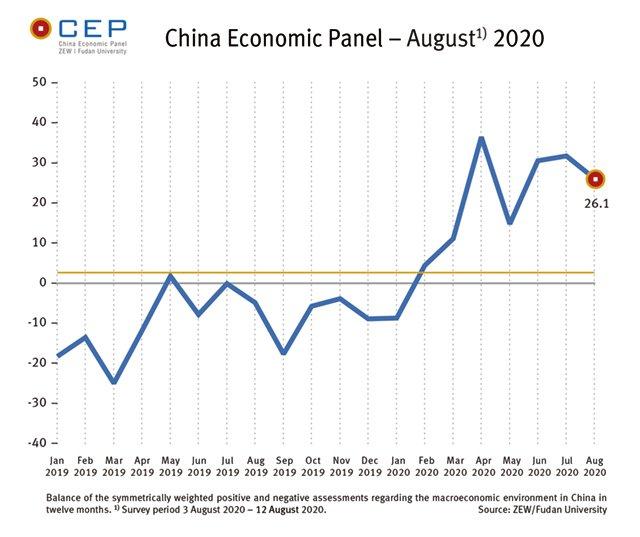“The CEP indicator is still quite high, however, and remains well above its historical average of 2.6 points,” says Dr. Michael Schröder, senior researcher in the “International Finance and Financial Management” Research Department at ZEW Mannheim and project leader of the CEP survey.
Yet, the positive growth expectations contrast with a considerably worse assessment of the economic situation compared to the previous month. The corresponding indicator fell by 19.2 points to a current reading of minus 29.2 points. “The experts see the Chinese economy as being in much better shape than that of the eurozone and the USA. Nevertheless, the majority (58.3 per cent) considers the situation of the Chinese economy to be poor,” says Michael Schröder, summarising the results of the survey. GDP growth back to normal not before 2021 Many observers were surprised by the 3.2 per cent growth in real gross domestic product (GDP) announced for the second quarter compared with the same quarter of the previous year. In the meantime, the experts have adjusted their growth forecasts for 2020 accordingly. For the third and fourth quarter of 2020, they expect GDP growth of 3.1 per cent and 3.6 per cent, respectively, and for the whole of 2020, they forecast a growth rate of 2.1 per cent. Although this figure is significantly higher than in the July survey, which predicted 0.8 per cent for 2020, this would still be a very poor result for the Chinese economy. With GDP growth of 4.3 per cent, a return to more normal levels is expected for 2021.
However, more and more of the panel participants believe that this growth is primarily being driven by government economic policy measures. Almost all respondents (around 95 per cent) assume that government consumption will rise in the coming 12 months, and around 90 per cent expect domestic government debt to increase. Despite the massive government support measures, the experts continue to see a decline in the employment rate (the corresponding indicator currently stands at minus 23.8 points). “The adverse effects of the coronavirus crisis on the Chinese economy will continue to be felt for some time to come,” says Michael Schröder.
Download the corresponding data sheet and graph.
ZEW in Mannheim conducts research in the field of applied and policy-oriented economics and provides access to important data sets for national and international researchers. The institute provides advice to policymakers, private companies and government institutions at both the national and EU level on how to tackle current economic policy challenges. The central concern of ZEW’s research is to analyse and design markets and institutions that allow for the sustainable and efficient development of knowledge-based economies in Europe. By keeping the public informed on its latest research and providing further training to researchers and business leaders alike, ZEW acts as a guide through economic change. ZEW was founded in 1991 and employs a staff of approximately 190, two thirds of whom are researchers. ZEW is a member of the Leibniz Association, a network of outstanding research institutes in Germany.
Research at ZEW
Labour Markets and Human Resources; Digital Economy; Economics of Innovation and Industrial Dynamics; International Finance and Financial Management; Social Policy and Redistribution; Environmental and Resource Economics, Environmental Management; Corporate Taxation and Public Finance; Market Design.
ZEW – Leibniz-Zentrum für Europäische Wirtschaftsforschung GmbH Mannheim
L 7
68161 Mannheim
Telefon: +49 (621) 1235-01
Telefax: +49 (621) 1235-222
http://www.zew.de
Press Officer
Telefon: +49 (621) 1235-133
E-Mail: cvd@zew.de
Senior Researcher in the ZEW Research Department
Telefon: +49 (621) 1235-368
E-Mail: michael.schroeder@zew.de
![]()
